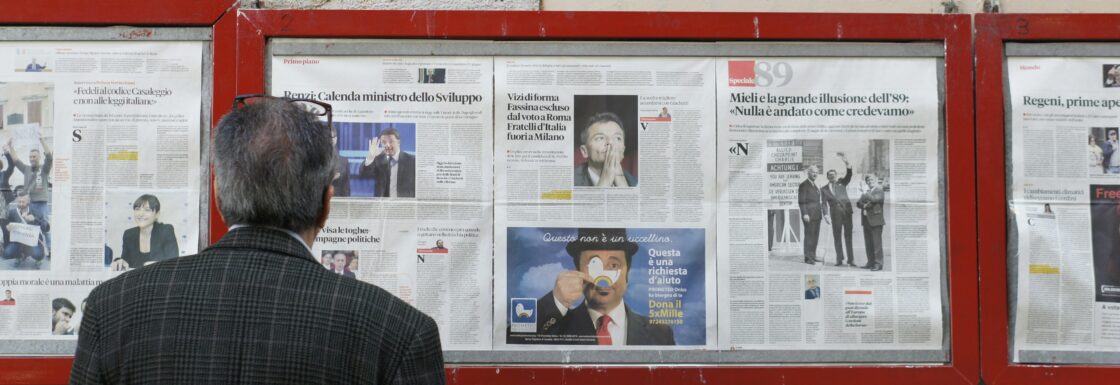Calling Out a New Wave of Climate Denial in Journalism

by John Woodside, Energy and Climate Reporter at Canada’s National Observer
Climate change is the crisis of our times, and newsrooms across Canada have a pivotal role to play informing audiences. Unfortunately, climate journalism in this country is in a sad state of affairs.
For Canadian media to do its job in a climate emergency, I believe we need to level up our standards. I’ll get to what I think should happen in a minute, but before we get to solutions we need to understand the problem.
There are many reasons why Canadian media is pretty bad on climate. The business models legacy media relied on for decades is collapsing, meaning newsrooms often don’t have the resources to put behind quality work. There are very few dedicated climate reporters. Most are generalists who are bouncing from topic to topic and unable to build real expertise; they’re just trying to hold onto a job in the face of massive layoffs.
Reporters are also under attack from some politicians and their supporters who believe in a choose-your-own-reality approach to facts. And unfortunately within newsrooms, there can be an attitude that the public won’t be able to understand complex issues, and so it’s important to simplify –– even if the simplification dumps the necessary context.
Thankfully, we’ve mostly evolved past publishing outright climate denial. But sadly, most mainstream news outlets have adopted a new wave of denial that is prepared to acknowledge climate change is real, but downplays the urgency of the crisis at hand. This distorts facts, inaccurately frames the risks and benefits of decisions, and therefore misleads readers.
Most mainstream news outlets have adopted a new wave of denial that is prepared to acknowledge climate change is real, but downplays the urgency of the crisis at hand. This distorts facts, inaccurately frames the risks and benefits of decisions, and therefore misleads readers.
John Woodside
This new climate denial is harder for most people to spot because it can sound reasonable. Think about how often you’ve heard some version of the following. “Sure climate change is real, but climate action will be costly to the economy,” or “Increasing fossil fuel production is compatible with climate action, as long as we make it cleaner using carbon capture.”
That’s not as extreme as saying climate change is a hoax, but it’s still on that climate denial spectrum because it misrepresents reality.
Climate action is good for the economy. Technologies that extend the life of the fossil fuel industry are incompatible with slashing greenhouse gas emissions at the pace required to avoid catastrophic warming. But generally speaking, you wouldn’t know that if your only source of climate news comes from Canada’s mainstream media.

This short article is not enough space to do a comprehensive analysis of all Canadian media, so I wanted to highlight Canada’s paper of record: the Globe and Mail.
The Globe’s Editorial Board is a space to share with readers the company’s view, and those views are often flirting with, if not fully embracing, this new wave of climate denial. In recent months it’s made the case that the oil industry and fighting climate change can go hand in hand; it’s argued that the economy can’t take a back seat to climate change, and getting to a clean economy can only be done with oil money; and it throws its weight behind carbon capture technology – a life preserver for Big Oil – endlessly.
For the record, the Globe and Mail is wrong. Climate science is crystal clear that phasing out fossil fuels, not just making them cleaner, is the only way to avoid catastrophic warming. This deeply misguided belief that the health of a fossil fuel based economy should take priority over the health of a climate safe economy is the fundamentally wrong question to ask. No investment is safe in a world of catastrophic warming.
I don’t bring the Globe’s lack of climate standards up just to beat up on them. I bring it up because this isn’t the Rebel, this isn’t the National Post, it’s not a fringe paper. It presents itself as a reliable source of credible information and yet is routinely a platform for misinformation at the highest levels. One explanation for this is that it doesn’t have the standards necessary for the emergency at hand.
It’s not just them. It seems to me that what’s missing in most newsrooms are comprehensive standards to guide climate change coverage.
Adopting climate standards would not be a radical change from how journalism works. In fact, journalists and their employers should reacquaint themselves with the tried-and-true values that have long guided this profession.

There’s an old saying that if one person says the sky is blue, and another says the sky is red, the reporter’s job is not to report both perspectives. It’s to look out the window and see what colour the sky is. This is basic fact checking to avoid what we call false balance. False balance gives audiences the impression that both perspectives are valid, even if one side is not grounded in facts. So if one person says equipping carbon capture to a fossil fuel facility is a climate solution, but the climate science says fossil fuels must be phased out, the journalist should not just throw their hands in the air and report both sides as if they are equal.
When it comes to the climate crisis, the stakes of accurately reporting the facts couldn’t be higher.
John Woodside
When it comes to the climate crisis, the stakes of accurately reporting the facts couldn’t be higher. A decade or two ago a news program might have one climate scientist saying burning fossil fuels is causing climate change on, and an oil and gas industry representative saying fossil fuels have nothing to do with this, and climate change isn’t real. That failure of journalism delayed climate action and helped poison the well of public discourse. That must stop if we’re going to successfully confront the crisis.
I’d propose the following as a starting point for newsrooms:
- Journalism should follow climate science as a non-negotiable starting point.
- Climate reporting isn’t just environmental reporting and climate lenses should be used across all beats because climate change affects everything.
- Climate change affects everyone, but not everyone equally. It’s important to bring a justice lens to reporting.
- Cover both the problem and the solutions. It’s a false dichotomy to focus on “doom and gloom” or “solutions.” The reality is different people are motivated by different things at different times. It’s all important and all worth covering.
- Be accessible. Climate change is complex, and reporters should drop the jargon when possible.
Beyond these (and with some overlap) Covering Climate Now has an excellent resource for newsrooms looking to incorporate climate standards I’d highly recommend.
The climate emergency is all hands on deck, and we can’t afford for newsrooms to stay on the sidelines. It’s high time they step up and help us make sense of the cascading problems unfolding. You see it just about everywhere you look.














